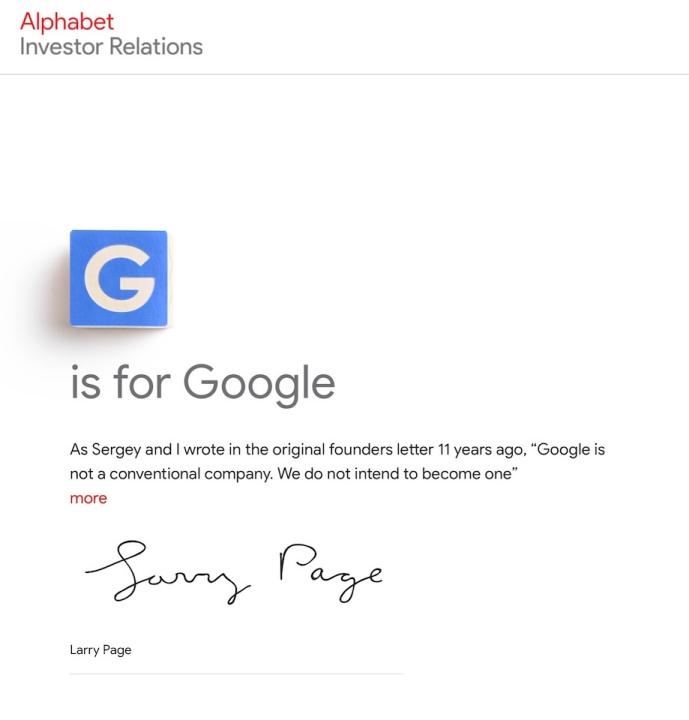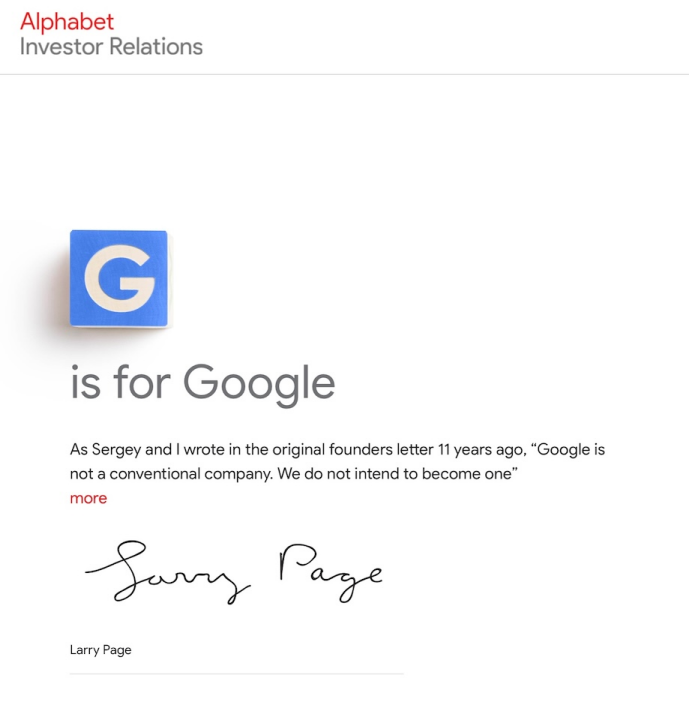
On March 15, 2010, I started a new job at Google. The fourteen years since that day feel like a century. The title of my announcement was Now A No-Evil Zone and, OK, I can hear the laughing from ten timezones away. I tried, then, to be restrained, but there are hardly words to describe how happy and excited I was. I had escaped from the accretion disk the former Sun Microsystems was forming around Oracle, that blackest of holes. And Google, in 2010, was the coolest place in the world to work.
Let me quote myself from a little bit further into that piece, on the subject of Google: “I’m sure that tendrils of stupidity and evil are even now finding interstitial breeding grounds whence they will emerge to cause grief.” Well, yeah.
This is in my mind these days as I’m on a retired-Googlers mailing list where the current round of layoffs is under discussion and, well, it really seems like the joy has well and truly departed the Googleplex.
But they did.
(The Alphabet “Investor Relations” page
is also its home page.)
It’s not just Google · The last two decades of my career featured the arcing then crashing of popular regard for Big Tech. It’s hard to believe now, the years when those lovably nerdy Bay Area kids were leading humanity to a brighter, better-lit future; our leaders were lionized and when people found out you actually worked for Google, their eyes widened and you could feel the focus.
These days, Big Tech features in hostile congressional hearings, mass layoffs, and messy antitrust litigation. It offers few experiences that can be uncritically enjoyed.
While I was inside the Rooms Where It Happened, it was actually pretty hard to notice the public trust in our work auguring into the mountainside of alienation and cynicism. Today, were I twenty years younger, I think I wouldn’t be able to stomach a Big-Tech job. It’s not that I think the companies are the problem, it’s the machineries and imperatives of Late Capitalism, which for a while we foolishly thought Internet companies could route around.
“Ten blue links” · I remember the dismissive phase well: Ten blue links was boring, it was the past, it was not what people wanted. They want answers to their questions, complete and correct, so much more wholesome than an abbreviated sampling of the General Internet Uproar. And that was partly right: When I type in “-12C in F” or “population of vietnam” I just want a number.
But those Ten Blue Links surfaced by the PageRank-that-was had a special magic. I found them intensely human, a reflection of the voices populating what remains of the Web, the only platform without a vendor. This was true when I was there and I said so, but was laughed at.
And now, in Anno Domini 2024, Google has lost its edge in search. There are plenty of things it can’t find. There are compelling alternatives. To me this feels like a big inflection point, because around the stumbling feet of the Big Tech dinosaurs, the Web’s mammals, agile and flexible, still scurry. They exhibit creative energy and strongly-flavored voices, and those voices still sometimes find and reinforce each other without being sock puppets of shareholder-value-focused private empires.
Psychopaths · For my money, that was the center of Google’s problem. Larry and Sergey were smart guys who recognized they didn’t know shit about corporateness and quickly got into a pattern of hiring and empowering psychotic pricks who were presumably “good at business”. OK, but don’t try to be special or magical or non-Evil. Not gonna talk about some of the things I saw because these people are wealthy and litigious.
But I do have a question.
What to use? · Among Google products, I mean. These days, when I use Google Search or Chrome or Maps I just don’t feel like they’re on my side. And maybe that’s not unreasonable; after all, I’m not paying for them. Problem is, the best alternatives aren’t obvious.
For now, here’s the direction I think I’m going: Use Chrome for Google stuff: Maps, Calendar, Docs, Translate. Safari and Firefox for non-Google stuff; they ain’t perfect but I think they’re better aligned with my interests.
Our family company is still on Google Workspace or whatever it is they call Dasher these days: Mail, Contacts, Photos, Calendar, Meet. It’s OK. We pay for it and the price is sane. I don’t feel like it’s looking for ways to monetize each keystroke. I’d totally consider a less-scary alternative.
I fear the combination of Google Maps and Reviews because it stinks of monopoly. But I use Maps anyhow in my car via Android Auto because it’s nicely integrated with YouTube Music (which I like) and Google Calendar. For a while I used the Here.com maps and liked them a lot. I guess I could listen to YouTube over Bluetooth.
Did I mention Android? I can’t stop using it, because I used to work in that building and because I decline to use iOS; If I wrote code for it I might not be able to give it away. And I carry Pixel phones, because I love the cameras. Having said that, hearing Andy Rubin’s name still makes my gut clench.
I love YouTube because I end most evenings, after everyone’s gone to bed, with a live musical performance by someone wonderful. But enshittification is creeping in at the edges.
That cafe · In 2012 I moved from Android to Google’s Identity group. It happened to be in the same buildings as Google+, at a time when Google was definitely putting all its wood behind that arrow. Larry and Sergey’s offices were there too (not a coincidence). There was a major fringe benefit: Access to the Cloud Café.
It was ethereal — OK, pretentious — almost beyond belief. Almost entirely vegetarian, rare plants hand-gathered by Zen monks and assembled into jewel-like little platelets-full that probably strengthened eleven different biochemical subsystems just by existing. And the desserts were beyond divine. Admittedly, sometimes when I left, my Norwegian-farmer metabolism grumbled a bit about not having had any proper food, but still.
It was wonderful. It was absurd. And I got a $90K bonus that year because Google+ hit its numbers.
It’s over, I think. It’s OK to miss it.
如有侵权请联系:admin#unsafe.sh
